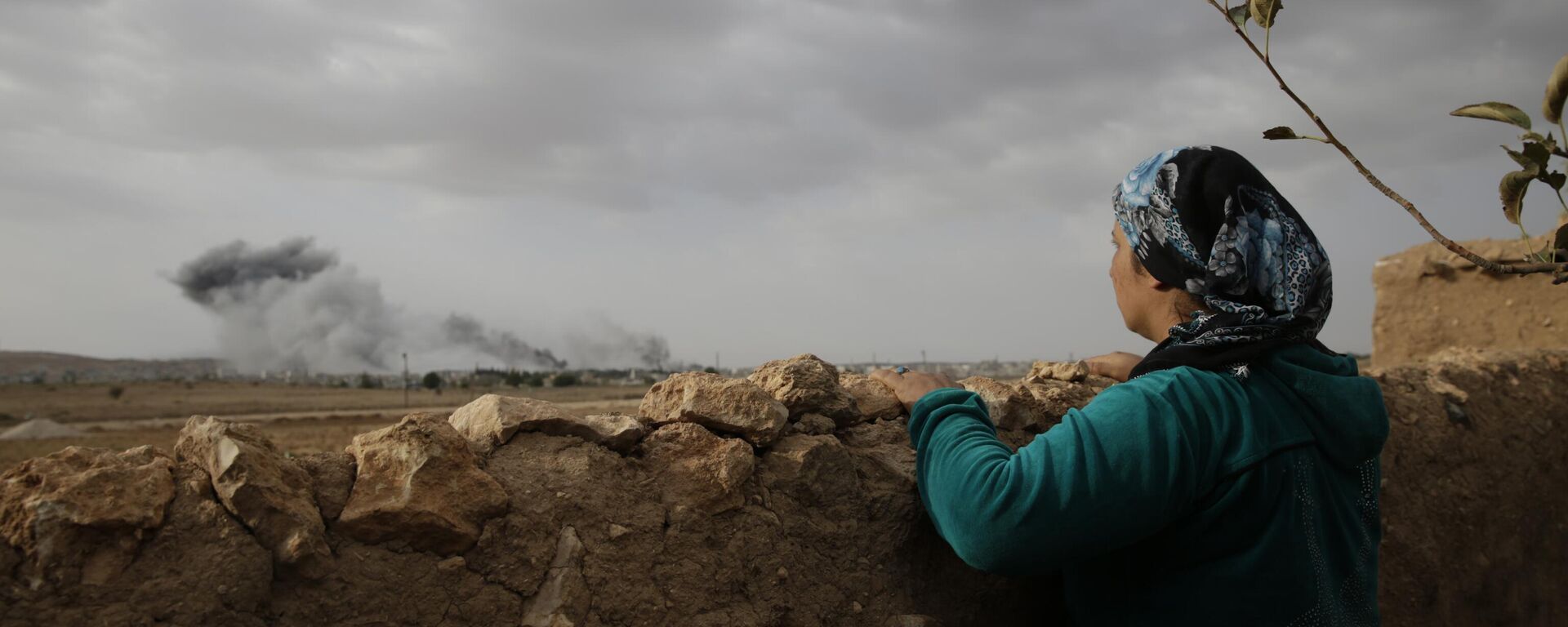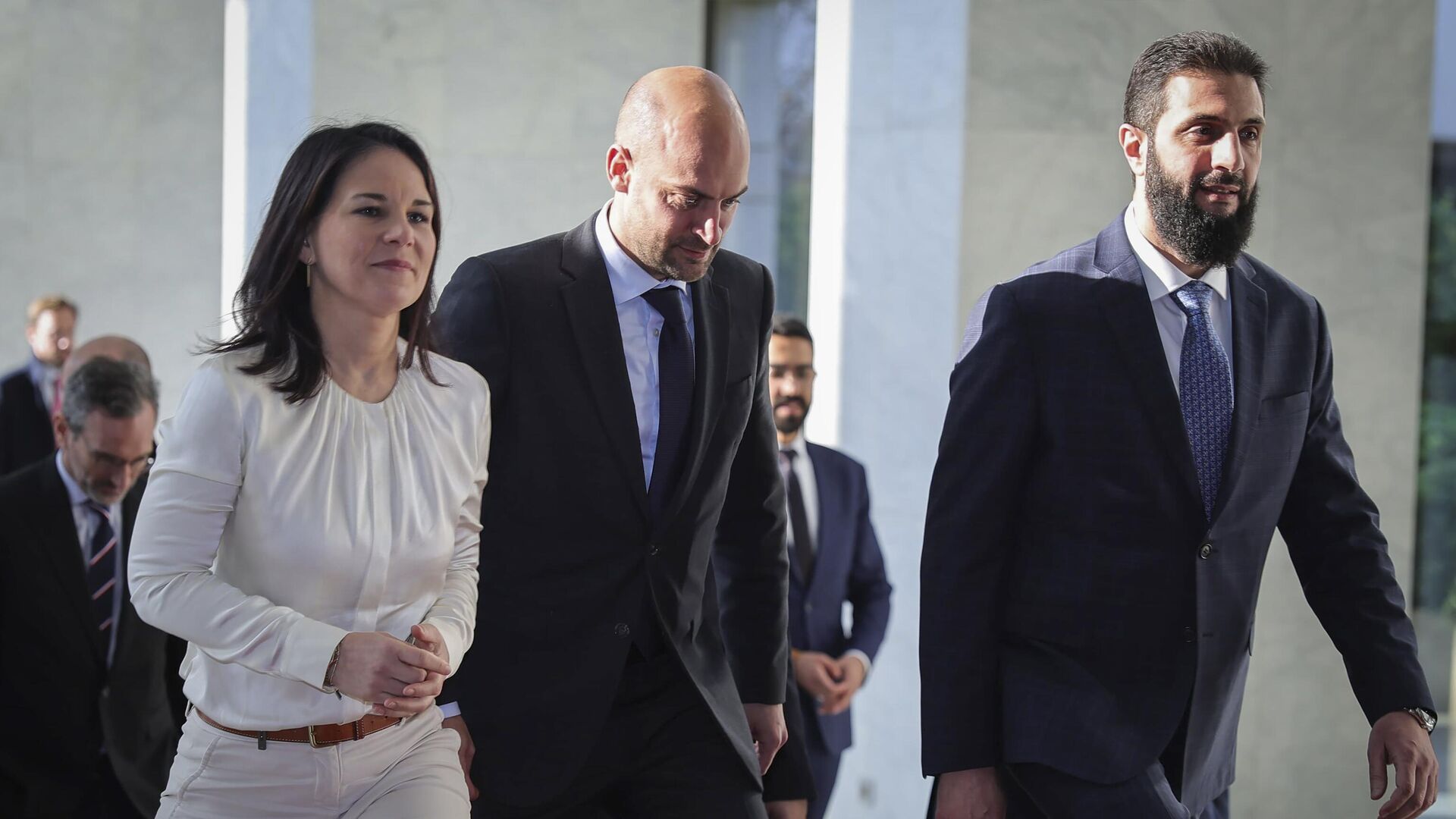https://sputnikglobe.com/20250104/despite-smiles-in-syria-supporting-kurdish-separatism-remains-germanys-top-priority-in-middle-east-1121354520.html
Despite Smiles in Syria, Supporting Kurdish Separatism Remains Germany's Top Priority in Middle East
Despite Smiles in Syria, Supporting Kurdish Separatism Remains Germany's Top Priority in Middle East
Sputnik International
German Foreign Minister Annalena Baerbock traveled to Damascus on Friday to meet with de-facto Syrian leader Abu Mohammed al-Golani. Sputnik asked regional security policy expert Furkan Halit Yolcu about the trip's purpose, and how it may impact Berlin's overall strategy in the region.
2025-01-04T18:00+0000
2025-01-04T18:00+0000
2025-01-04T18:00+0000
analysis
annalena baerbock
europe
syria
turkiye
kurdish people's protection units (ypg)
european union (eu)
kurds
https://cdn1.img.sputnikglobe.com/img/07e9/01/04/1121354851_0:0:3073:1728_1920x0_80_0_0_8988cb84b5d835587795a71e66d24c82.jpg
Berlin’s modern-day foreign policy is focused on two things: antagonizing Russia and a search for energy, and Annalena Baerbock’s Syria trip was aimed primarily at “trying to secure relations with parties that hold a good grasp on energy resources,” i.e. the separatist Kurds in the war-torn country's northeast, Sakarya University security policy expert and researcher Furkan Halit Yolcu told Sputnik.Pointing to long-standing German support for Kurdish separatist movements across the region, from Syria and Iraq to Turkiye, Yolcu pointed out with the YPG militias controlling “a good amount of energy reserves” in Syria, Germany is looking to avoid losing “its leverage on that side,” while trying to get a sense of where Transitional Government head Abu Mohammad al-Julani stands, and convince him, if possible, of Germany’s potential support in the coming years if he avoids an escalation against YPG positions.Ultimately, Yolcu doesn’t expect Berlin to give up on its support for Kurdish groups in Syria, Iraq or Turkiye, with such support giving them the means to pressure all three countries, as “leverage for them, mainly against Turkiye. They have been sending agents, sending financial support, sending equipment.”Accordingly, as far as Syria is concerned, the Kurds - an namely the separatist Kurdish elements, are what’s most important for Berlin, the Turkish security policy analyst summed up.
https://sputnikglobe.com/20241224/turkiye-syria-mull-joint-military-operation-against-syrian-kurds---reports-1121251978.html
syria
turkiye
Sputnik International
feedback@sputniknews.com
+74956456601
MIA „Rossiya Segodnya“
2025
News
en_EN
Sputnik International
feedback@sputniknews.com
+74956456601
MIA „Rossiya Segodnya“
Sputnik International
feedback@sputniknews.com
+74956456601
MIA „Rossiya Segodnya“
why did baerbock go to syria, what was baerbock doing in syria
why did baerbock go to syria, what was baerbock doing in syria
Despite Smiles in Syria, Supporting Kurdish Separatism Remains Germany's Top Priority in Middle East
German Foreign Minister Annalena Baerbock traveled to Damascus on Friday to meet with de-facto Syrian leader Abu Mohammed al-Golani. Sputnik asked regional security policy expert Furkan Halit Yolcu about the trip's purpose, and how it may impact Berlin's overall strategy in the region.
Berlin’s modern-day foreign policy is focused on two things: antagonizing Russia and a search for energy, and Annalena Baerbock’s Syria trip was aimed primarily at “trying to secure relations with parties that hold a good grasp on energy resources,” i.e. the separatist Kurds in the war-torn country's northeast, Sakarya University security policy expert and researcher Furkan Halit Yolcu told Sputnik.
Pointing to long-standing German support for Kurdish separatist movements across the region, from Syria and Iraq to Turkiye, Yolcu pointed out with the YPG militias controlling “a good amount of energy reserves” in Syria, Germany is looking to avoid losing “its leverage on that side,” while trying to get a sense of where Transitional Government head Abu Mohammad al-Julani stands, and convince him, if possible, of Germany’s potential support in the coming years if he avoids an escalation against YPG positions.

24 December 2024, 06:56 GMT
Ultimately, Yolcu doesn’t expect Berlin to give up on its support for Kurdish groups in Syria, Iraq or Turkiye, with such support giving them the means to pressure all three countries, as “leverage for them, mainly against Turkiye. They have been sending agents, sending financial support, sending equipment.”
Accordingly, as far as Syria is concerned, the Kurds - an namely the separatist Kurdish elements, are what’s most important for Berlin, the Turkish security policy analyst summed up.



